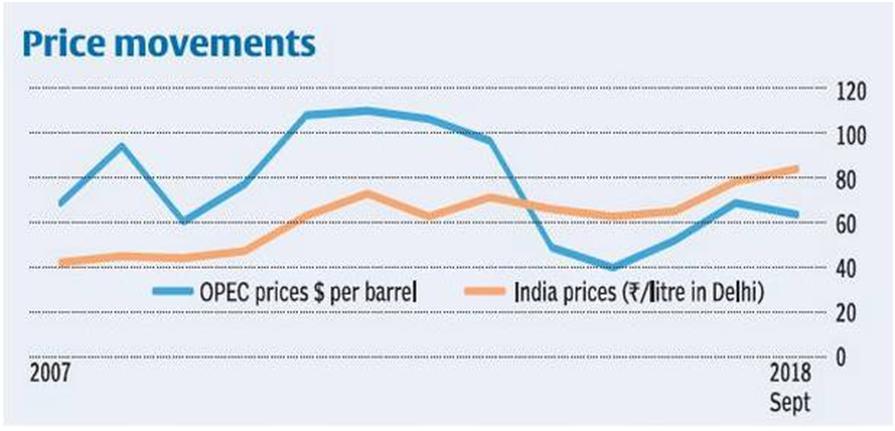What is the issue?
Petroleum prices are rising and there are considerable demands to the centre to reduce its excise duties on the product.
How the sector was deregulated?
- Being a basic intermediate good, it is operated through a special oil pool account funded by the surplus of ONGC and the refining companies, as well as direct government subsidies.
- Being an ideal commodity for indirect tax, high Central excise duty and high sales tax rates by the states at the retail level were levied.
- With the rising trend in international crude oil prices the subsidy burden of the oil pool account began to mount.
- There were demands that the oil market should be deregulated.
- But the excise revenues from oil was substantially larger than the subsidies provided by the centre.
- Also, the surpluses of petroleum mining and refining companies were substantial enough for cross subsidisation of the loss-making retail oil companies.
- But the entry of private players like Reliance and Essar into the retail trade made cross-subsidisation untenable.
- Thus the administered Price Mechanism for petroleum was dismantled and market pricing mechanism was allowed.
What was the consequence?
- The Centre chose to increase the excise duty on petrol and diesel, although OPEC prices showed a downward trend.
- The hike in excise duty was 380 per cent for diesel and 120 per cent for petrol between 2014 and 2017.
- The C&AG Report has observed that the huge increase in central excise collection from petroleum products (2015-16) was due to a sharp increase in per unit tax on petrol and diesel.
- The excise duty revenue of the central government from petroleum products which was Rs.88600 crores in 2013-14 peaked to Rs.2,53,254 crores in 2016-17.
- Never has indirect tax on any commodity witnessed such a sharp escalation as on petroleum products.

What is the present scenario?
- The international prices crude oil began to rise from late 2016.
- Yet the Centre refused to reduce the excise duties and prodded oil companies to raise their retail selling prices.
- The Centre fears an adverse impact on fiscal deficit, if any additional revenue from petroleum productsgets lost.
- The depreciating rupee also added to their woes.
- However, rising fuel prices are stoking an inflationary fire and imposing an unbearable burden on the people.
Should the states be held responsible?
- States are benefiting from petroleum price escalation through higher devolution after the 14th Finance Commission award in the share of central excise duty.
- However, only basic excise duty on petrol and diesel is shareable with the States and others are outside the divisible pool of taxes shareable with the States.

- Also, VAT rates has been hardly increasedin recent years and even some states have already reduced VAT rates to moderate the current price escalation.
What should the centre do?
- The centre argues that it keeps a substantial portion outside the shareable pool for its obligations on social sector spending.
- There is no established connection between higher duties on petroleum products and social sector spending.
- A demand has also been made that petroleum products be included in the GST.
- But before it gets into reality, a compensation package has to be finalised as per the GST compensation law.
- This would make the present compensation cess to be inadequate.
- Thus the solution is for the Centre to immediately roll back its excise duty spikes.
Source: Business Line


